Two types of people are interested in change management interview questions.
First up, it’s job seekers. If you want a job in change management, you need to know how you will show your understanding.
Secondly, it’s for recruiters. When hiring new change management professionals, you might not be an expert in change management.
This article is for both job seekers and recruiters. In other words, if you want to navigate the difficult world of organizational change interviews, you’ve come to the right place.
Below, we’ll cover the main change management topics you should prepare for. We’ll mention some of the “standard” interview questions you’ll find anywhere, but the focus will be on change management.
Finally, we’ll provide more reflective information for both sides of the job-hunting process. We’ll see a few interview tips for job hunters that can help you ace your next interview. For recruiters, we’ll share some ideas for assessing your change management interview candidates.
If you’re a candidate, you know you want to prepare best. And if you’re a recruiter, you should know that it’s your responsibility to carefully plan questions that remain the same for every candidate, as a CIPD report explains. So, read on and deepen your knowledge of change management interview questions.
20 Change Management Interview Questions
Here are some change management interview questions you can expect during a job interview.
These 20 questions have been broken down into a few major categories.
Your Track Record with the Change Management Process
Expect to be asked about your track record, specifically regarding change management.
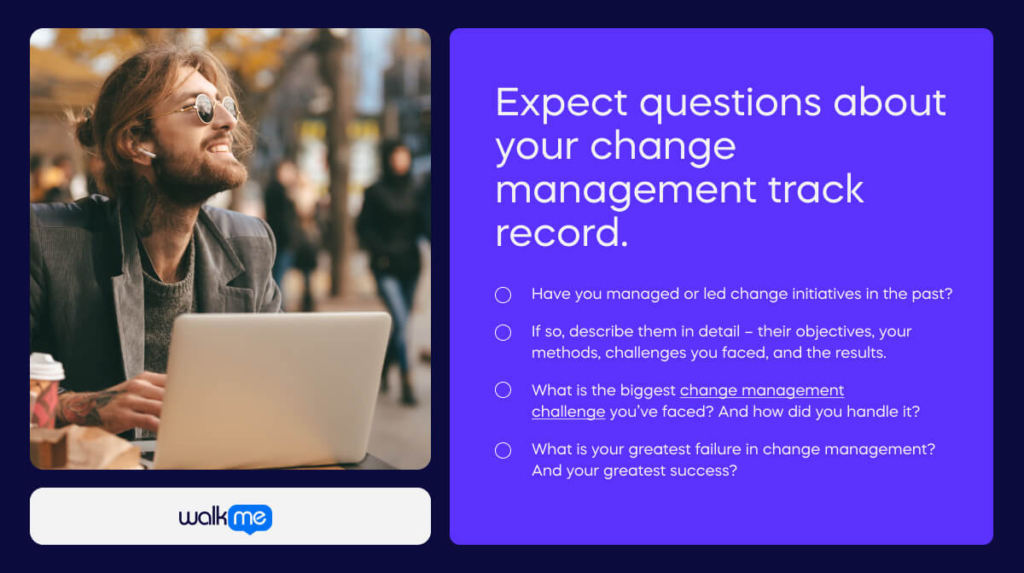
- Have you managed or led change initiatives in the past?
- If so, describe them in detail – their objectives, your methods, challenges you faced, and the results.
- What is the biggest change management challenge you’ve faced? And how did you handle it?
- What is your greatest failure in change management? And your greatest success?
You may also be asked about other aspects of your experience, such as your education.
However, as with most interviews, the focus will likely be on your accomplishments and experience.
Analysis and Assessment
Your ability to analyze and solve problems is key to your success.
They will want to know how you approach this analysis and how you find solutions.
- How do you recognize the need for change?
- What steps do you take when analyzing the need for change?
- What metrics do you use when analyzing your own program’s performance?
- How would you go about improving your program’s performance?
Examples from your work history can show that you know what you’re talking about.
Expertise
The interviewer will certainly ask questions designed to test your change management knowledge, such as:
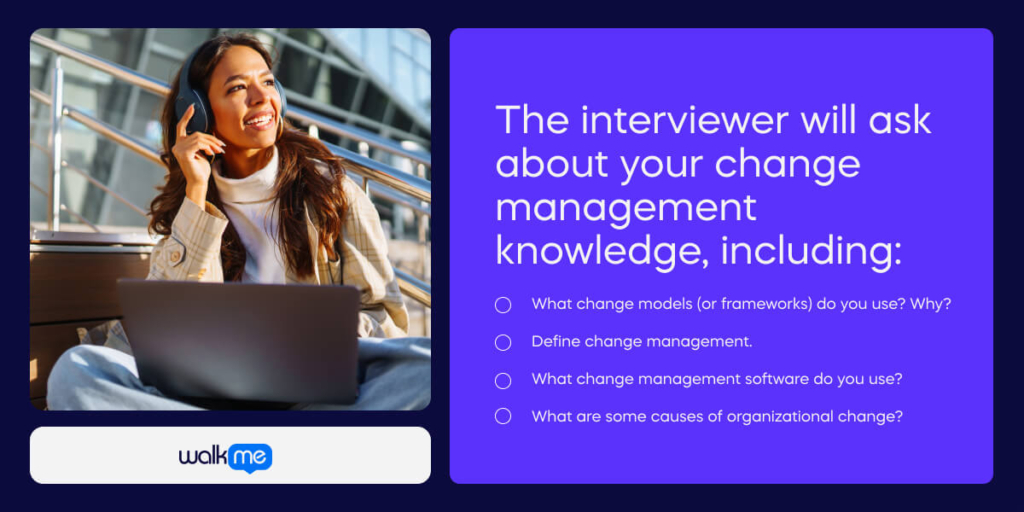
- What change models (or frameworks) do you use? Why?
- Define change management.
- What change management software do you use?
- What are some causes of organizational change?
Knowing about industry-wide change theory, such as Kotter’s 8-step change model, Prosci’s ADKAR model, and the Lewin change model, can be helpful here.
Communication Skills
Communication is perhaps the most important skill for a change manager.
Expect questions such as:
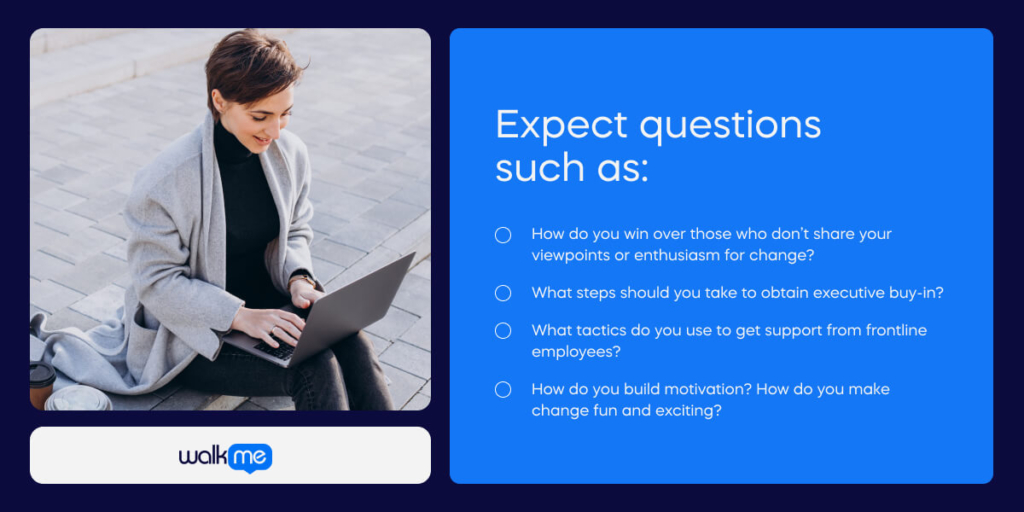
- How do you win over those who don’t share your viewpoints or enthusiasm for change?
- What steps should you take to obtain executive buy-in?
- What tactics do you use to get support from frontline employees?
- How do you build motivation? How do you make change fun and exciting?
Ideally, you will be able to demonstrate your communication skills during the interview itself.
However, it can be useful to think of a few instances in your career that demonstrate your skills. Think of stories that show your ability to communicate, lead teams, mediate, and negotiate.
Dealing with Challenges
Challenges are a part of any job.
For change managers, overcoming challenges can make or break a change initiative.
Questions such as these can help you prepare for your interview:
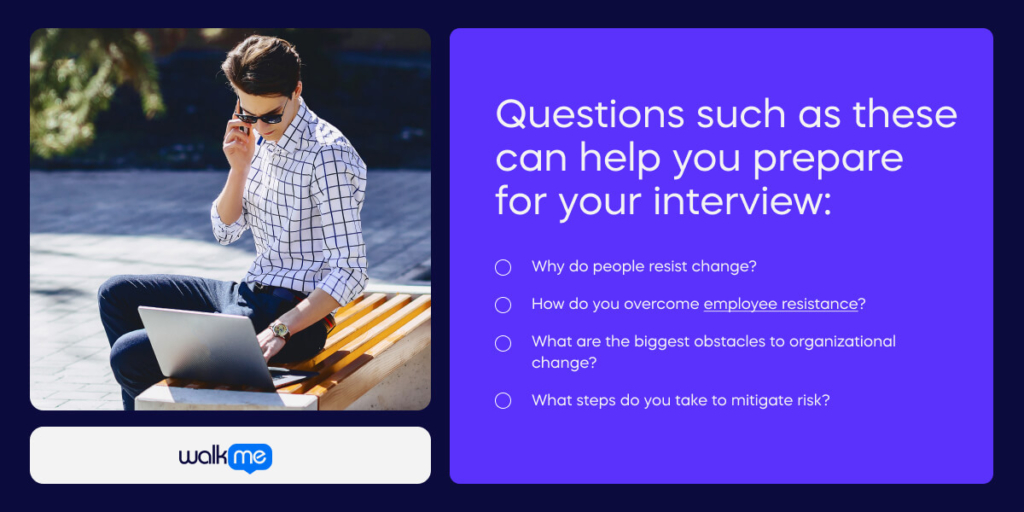
- Why do people resist change?
- How do you overcome employee resistance?
- What are the biggest obstacles to organizational change?
- What steps do you take to mitigate risk?
As with the other sections here, consider ways you’ve beat challenges in the past.
Also, think of ways to prepare for imaginary scenarios. Interviewers will use them to test your flexibility and adaptability.
General job application questions
If you’re applying for a job in change management, you’re right to focus on change management questions.
But don’t forget to prepare the basics. In a 2022 Gartner article, leading recruiters shared some of their favorites:
- Why did you choose to apply for this position?
- Tell me about a time you learned something on your own.
- How do you prioritize your day?
Good answers to these questions show the recruiters you’re core motivations. If you can show you love change management work, perhaps a gap in your knowledge won’t be so important.
Tips for answering change management interview questions
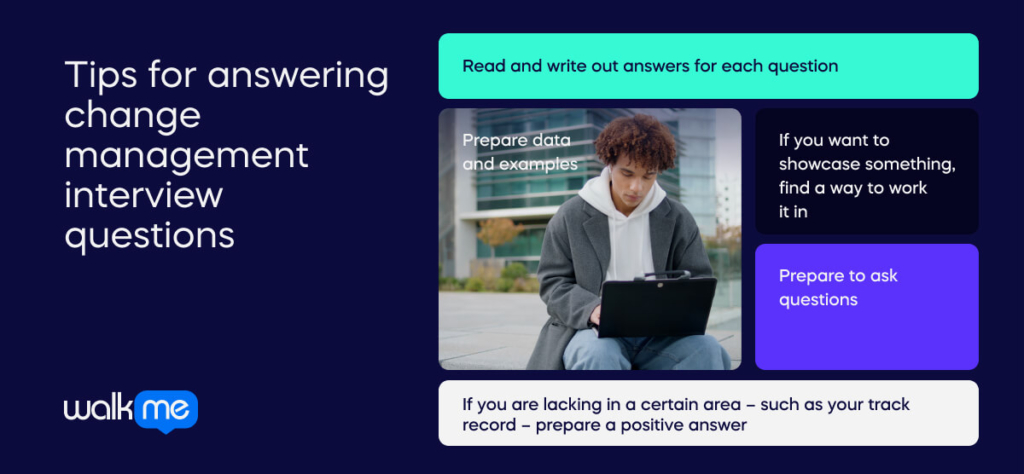
Here are a few parting tips to help you ace your next interview:
- Prepare data and examples. Look closely at the job description. What have you done to prove you can perform every task? Prepare to tell the interviewers what you did and how your actions improved results.
- Read and write out answers for each question. Or, at least take notes on the topics mentioned above. Naturally, you won’t take this with you. But it will help you formulate an answer beforehand.
- If you are lacking in a certain area – such as your track record – prepare a positive answer. Not: “I have never used change management software.” Instead: “I use project management software and other tools.”
- If you want to showcase something, find a way to work it in. You need to show off your greatest strengths, so don’t be completely passive during an interview – remember that you need to sell yourself to them.
- Prepare to ask questions. In most interviews, there’s a chance for the candidates to ask questions themselves. Not everyone uses this opportunity, and it looks bad. As Tori Dunlap explained in a 2021 HBR podcast – “It shows you’re not prepared. It shows you’re not interested”. Have a question prepared about their change projects, work environment, or personal motivations – it will go a long way.
- Always focus on their needs and how you can benefit them. Everything you discuss, such as your experience and accomplishments, should be framed to show how it will benefit the organization. Remember, their top concern is ROI, retention, and success for their company.
How to assess Change Management skills
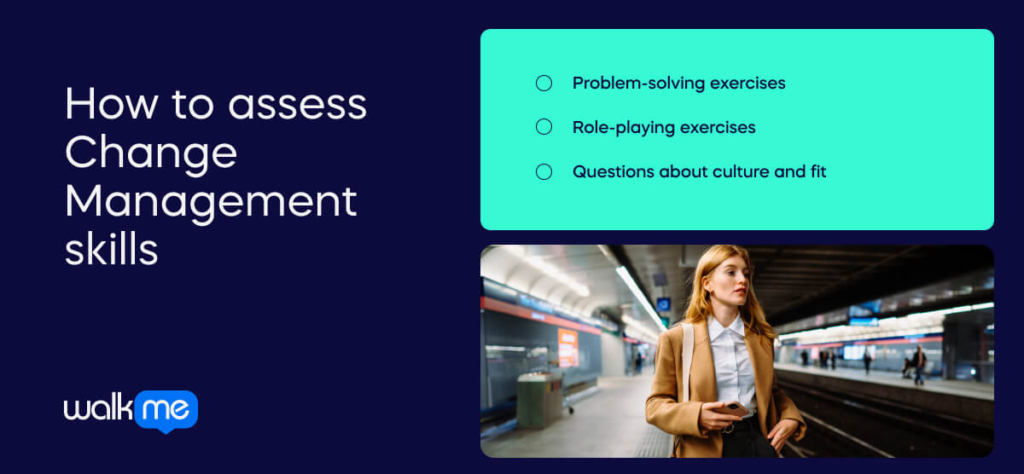
Change management relies on theoretical and practical knowledge. It’s great if a candidate knows about the latest organizational change theory trends. Does this show that they’ll be capable of implementing practical change projects?
If you’re a recruiter, consider these innovative ways to test your candidates’ suitability.
Problem-solving exercises
Problem-solving skills are a great way to assess change management skills. Ask candidates to present solutions for hypothetical scenarios and test how they use data, analysis, and planning. You can also ask candidates about their opinions on change management theories. This helps you identify the candidate’s level of knowledge around change management processes, principles, and models.
Role-playing exercises
Ask the candidate to role-play a change management scenario relevant to the job they’re applying for. Observe how they respond to resistance, communicate with team members, and lead the process. Although role-play may be difficult to set up, it’s a great way to test their leadership skills and get insight into how they handle change in the workplace.
Questions about culture and fit
Will the candidate fit into your company’s current culture? For change management, this is an essential requirement. The wrong person could up-end your efforts. You might ask situational questions about managing conflict, check for their personal values, or make observations about their nonverbal behaviors. Altogether, this will give you a better understanding of their fit for the job.
Prepare for job interview success
So, we’ve investigated many interesting job questions. They will be useful for anyone preparing to recruit a candidate: after all, excellent question preparation is a key skill for recruiters, as Rebecca Knight explained in a 2015 HBR article.
And, of course, understanding the questions is a vital stepping stone for candidates. But remember: the questions are just one part of the job interview. In a 2021 article for Forbes, Tomas Chamorro-Premuzic pointed out that “giving wrong answers” was just one strategy for failure – alongside tardiness, eye contact, talking too much, and failing to listen. So if it’s the night before your interview, and you’re starting to feel worried – try to relax. Look over these questions. But above all, make sure you get some good rest.
Common Questions
Describe how you linked past change initiatives to organizational strategy by referencing KPIs, business goals, or stakeholder priorities—a real-world expectation in 2025 interviews.
Employers expect use of analytics to assess readiness, monitor progress, and optimize interventions—highlighting data’s central role in strategic change.
Always. Using frameworks like STAR ensures examples are structured, measurable, and persuasive—industry best practice.
Frame it as a learning experience: describe the challenge, root causes, corrective actions, and positive outcome—demonstrating resilience and continuous improvement.

